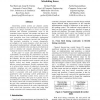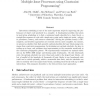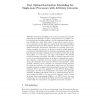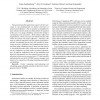35 search results - page 1 / 7 » Improving Quality-of-Control Using Flexible Timing Constrain... |
114
click to vote
RTSS
2002
IEEE
15 years 5 months ago
2002
IEEE
Closed-loop control systems are dynamic systems subject to perturbations. One of the main concerns of the control is to design controllers to correct or limit the deviation that t...
106
Voted
IJAIT
2008
15 years 17 days ago
2008
Instruction scheduling is one of the most important steps for improving the performance of object code produced by a compiler. A fundamental problem that arises in instruction sch...
106
Voted
CP
2001
Springer
15 years 5 months ago
2001
Springer
Instruction scheduling is one of the most important steps for improving the performance of object code produced by a compiler. The local instruction scheduling problem is to nd a m...
105
Voted
IPPS
2003
IEEE
15 years 5 months ago
2003
IEEE
Fine-grained parallel applications require all their processes to run simultaneously on distinct processors to achieve good efficiency. This is typically accomplished by space sl...
98
Voted
DAC
1995
ACM
15 years 4 months ago
1995
ACM
- We introduce a transformation, named rephasing, that manipulates the timing parameters in control-dataflow graphs. Traditionally high-level synthesis systems for DSP have either ...




